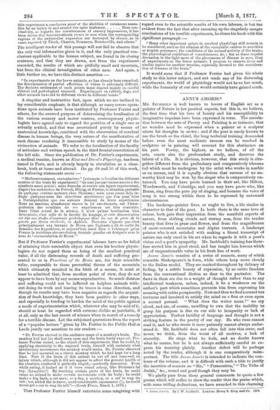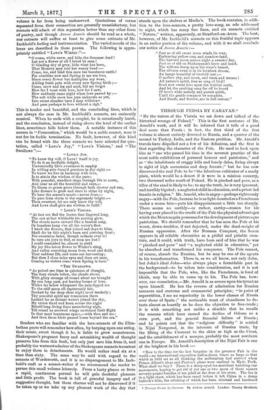ANNUS AMORIS.*
MR. INcanom is well known to lovers of English art as a painter of Nature in her poetical aspects, but this is, we believe, the first time that his love of beauty and his susceptibility to imaginative impulses have been expressed in verse. The associa- tion between the arts of Poetry and Painting is so intimate, that no wonder need be expressed when a painter or a sculptor utters his thoughts in metre ; and if the poet is rarely known to use the brush or the chisel, the long technical training demanded before even the most moderate success can be reached in sculpture or in painting will account for this abstinence on his part. Poetry, the highest, as we believe, of all the arts, exacts also the profoundest study, and deserves the labour of a life. It is obvious, however, that this study is alto- gether different from the preliminary and comparatively irksome toil which must be undergone by the artist who works in marble or on canvas, and it is equally obvious that success of no un- worthy kind may be won by the singer who is comparatively un- tutored. You may have 'poets learned in their art, like Milton, Wordsworth, and Coleridge, and you may have poets who, like Burns, sing from the pure joy of singing, and because the voice of song is too strong within them to be repressed by untoward circumstances.
The landscape-painter lives, or ought to live, a life similar in character to that of the poet. In both there is the same love of colour, both gain their inspiration from the manifold aspects of nature, from shifting clouds and stormy seas, from the tender beauty that lives in grass and flower, and from the magnificence of snow-covered mountains and Alpine torrents. A landscape painter who is not satisfied with making a literal transcript of nature can only excel in his art when he regards it with a poet's vision and a poet's sympathy. Mr. Inchbold's training has there- fore served him in good stead, and has taught him lessons which are of unquestionable value in his fresh line of work.
Annus Amoris consists of a series of sonnets, many of which
resemble Shakespeare's in form, while others keep more closely to the Italian model. They are marked throughout by delicacy of feeling, by a subtle beauty of expression, by an entire freedom from the conventional diction so dear to the poetaster. The flaws in them are due to a weight of thought rather than to any intellectual weakness, unless, indeed, it be a weakness on the author's part which sometimes prevents him from expressing his meaning with entire perspicacity. Now and then we find a sonnet too tortuous and involved to satisfy the mind on a first or even upon a second perusal. "What does the writer mean ?" we cry aloud, and are, of course, unwilling to own that the inability to grasp his purpose is due on our side to incapacity or lack of appreciation. Perfect lucidity of language and thought is not a striking feature in the poetry of our day. He who runs cannot read it, and he who treats it more patiently cannot always under- stand it. Mr. Inchbold does not often fall into this error, and never, we think, from the worst of all motives, a lack of
sincerity. He sings what he feels, and no doubt knows what he means, but he is not always sufficiently careful to ex- press his meaning plainly. Another defect will be perhaps noted by the reader, although it is one comparatively unim- portant. The title Annus Amoris is intended to indicate the con- tents of the volume, and it is difficult with such a title to justify the insertion of sonnets on "Sin," "Persecution," "The Tribe of Judah," &c., sound and good though they may be.
We gladly pass from these general comments to quote a few poems which will suffice to show the reader that the praise which, with some trifling deductions, we have awarded to this charming
Annus Amoris. By J. W. Inehbold. London: Henry S. ging and 0o. 1876.
volume is far from being undeserved. Quotations of verses separated from their connection are generally unsatisfactory, but sonnets will admit of this separation better than any other form of poetry, and though Annus Amoris should be read as a whole, our extracts will suffice at least to give some estimate of Mr. Inchbold's feeling and instrumentation. The varied moods of the lover are described in these poems. The following is appro- priately entitled "Love's Winter :"—
" 0 come, white snow, and hide the Summer dead ! Let not a flower of all I loved be seen 0 blinding sky of grey, hide what has been, That Memory may rest her weary head :- Come, ice, and bind this once too beauteous earth I For sunshine now and Spring to me are foes, Since every flower but multiplies my woes, Adding fresh pain with every new Spring birth ;— Come, snow and ice and mist, bid me forget How far I went with love, how far I saw, How suddenly came night when love passed by :— The soft white snow has joys unknown as yet, Into sweet slumber here I may withdraw And pass perhaps to love without a sigh."
This is tender and beautiful, and the concluding lines, which is not always the ease in Mr. Inchbold's sonnets, are eminently musical. When he ends with a couplet, he is occasionally harsh, and the conclusion, instead of rising above the level of the earlier lines, sometimes falls below them. A notable instance of this occurs in "Persecution," which would be a noble sonnet, were it not for its feeble termination. No fault, however, of this kind ean be found with the three sonnets we have selected for quo- tation, called "Love's Joy," "Love's Visions," and "The Swallows ":—
"LOVE S JOY.
"To know thy will, 0 Love! itself is joy, To do it an ineffable delight, Unweariedly life's sweetness to employ In willing acts deem'd gracious in thy eight :— To know we live in harmony with love, Is to attain the wisdom of the pure; With peaceful, steadfast steps through life to move,
And near us all the beautiful and sure,—
To bloom as green grass through both shower and sun, Like flowers to grow and stars to shine by night,
To hear the season's music—never done,—
To pass from storm to the supremely bright :— Then sweetest, let me only know thy will, And Love shall give me wisdom to fulfil."
" LOVE'S VISIONS.
"At last are fled the leaves that lingered long, The sun at last withholds his parting glow, The clouds move onward like a funeral song, Or hopeless hang o'er all the water's flow. I know the flowers, that joined sad days to bliss, Shall die by this night's keen and piercing frost ; For sweetness fades, though sadness ever is!
So rare are joys to find, so soon are lost !
I could contented be, almost to yield My joy like latest flower to Winter's sting, And sullen searching moan from wood and field, That saddens life, and mars our harvesting ; But then I close mine eyes and thou art near, Coming as violets come when Spring is here."
"THE SWALLOWS.
"As poised one time in quietness of thought, The fiery clouds below, the clouds above, With glory strange all round about me brought By sun long past, yet leaving beams of love, Whilst far below whispered the pale-lipped sea To the still moon all rapturously fair, Decked by the deep clear night most tenderly ; Thy peaceful spirit my companion thero Looked far as distant waters joined the sky, My vision fixed and keen across the night Beheld long living lines meandering nigh, Till round us arrowed wings sustained their flight In that most beauteous space,—with thee and me : And then these birds passed home beyond the sea."
Readers who are familiar with the love-sonnets of the Eliza- bethan poets will remember how often, by harping upon one string, their music, sweet though it be, is liable to grow monotonous. Shakespeare's pregnant fancy and astonishing wealth of thought preserve him from this fault, but only just save him from it, and probably the warmest admirer of the Shakespeare sonnets is content to enjoy them in detachments. He would rather read six at a time than sixty. The same may be said with regard to the sonnets of Wordsworth, and it is no disparagement to Mr. Inch- bold's craft as a sonnet-writer if we recommend the reader to peruse this small volume leisurely. From a hasty glance or from a rapid, continuous perusal he will gain doubtful pleasure and little profit. The book is full of graceful imagery and of suggestive thought, but these charms will not be discovered if it be taken up as we take up any pleasant work of the day that
stands upon the shelves at Mudie's. The book contains, in addi- tion to the love-sonnets, a pretty love-song, an ode addressed to night, which has many fine lines, and six sonnets entitled "Nature," written, apparently, at Stratford-on-Avon. The best, however, of Mr. Inchbold's sonnets on this fruitful topic appears in an earlier portion of the volume, and with it we shall conclude our notice of Annus Amoris :—
"Just as of old sweet Avon winds its way,
Embracing yellow corn and meadow-land, The harvest moon makes night a sweeter day, Just as of old on Shakespeare's brow and hand, The willows droop upon the river's breast, The silvern swan is in its loveliest dream, An image beautiful of twofold rest ;- O mellow sky, and moon, and stars, and stream !
All nature's spirit, free as song of bird !
Send now sweet love upon the fruitful earth, And let the exulting song far off be heard Of love's wide melody and purest mirth, Until the gentle conquest be complete, And Death, and Sorrow, are in full retreat."



































 Previous page
Previous page